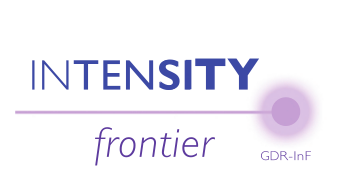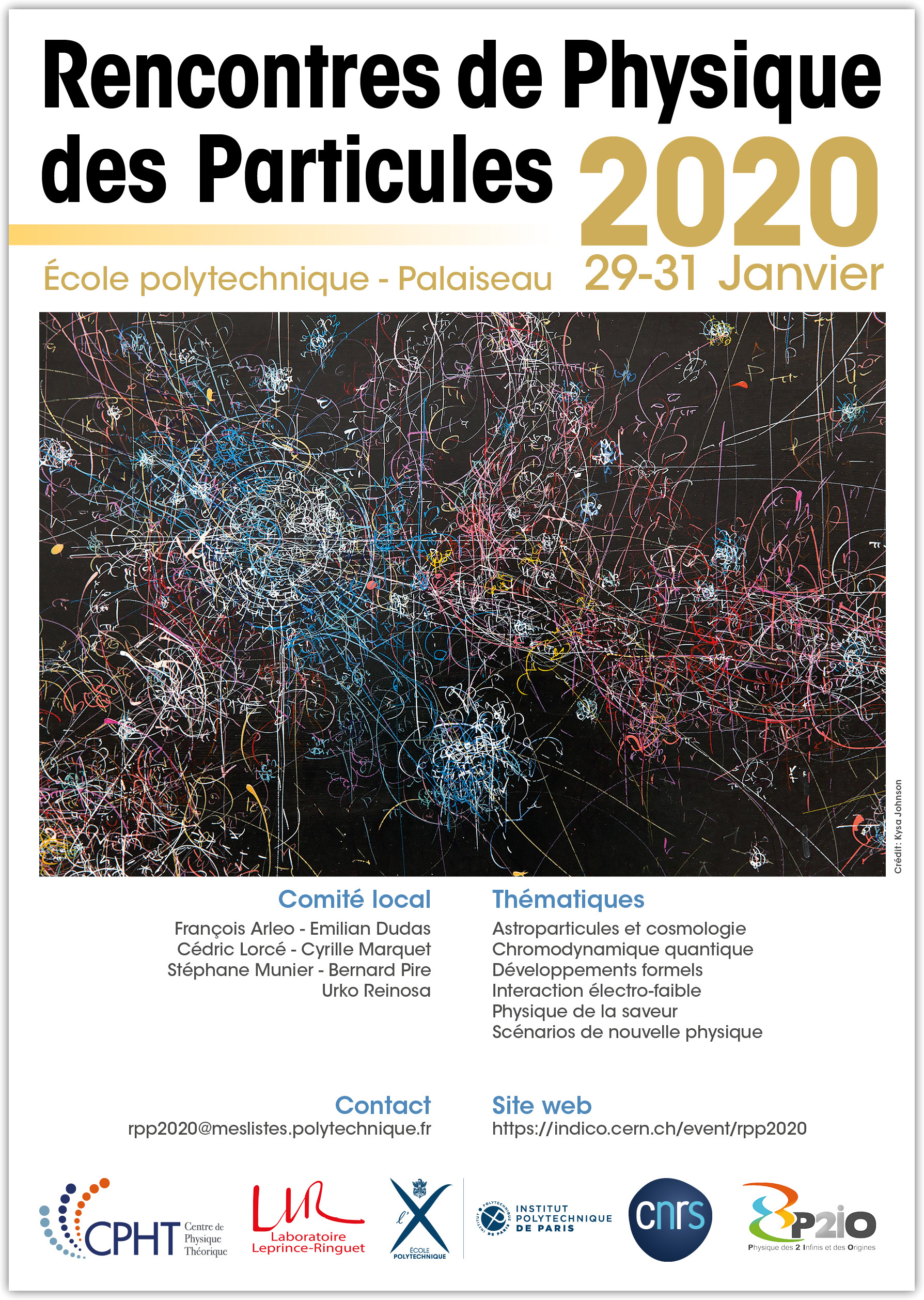Rencontres de Physique des Particules 2020
L'édition 2020 de la Rencontre de Physique des Particules aura lieu à l'École polytechnique, du mercredi 29 janvier à 10h30 au vendredi 31 janvier à 16h00. Les inscriptions sont ouvertes jusqu'au 15 janvier 2020.
Nous avons prévu un certain nombre d'exposés de revue et une session de discussion, ainsi que l'organisation d'une assemblée générale sur les perspectives de notre discipline.
Nous vous invitons à soumettre une proposition d'exposé (20 minutes) dans la rubrique "Abstract submission". La date limite pour l'envoi des abstracts est fixée au 15 janvier 2020.
The 2020 edition of the Rencontre de Physique des Particules will be held at École polytechnique, from Wednesday 29 January at 10.30am to Friday 31 January at 4pm. Registration will be open until January 15, 2020.
We have foreseen a number of review talks, a discussion session, as well as the organisation of a Round Table on the status and perspectives of our field.
We invite you to submit an abstract for a talk (20 minutes) in the section "Abstract submission". The deadline for abstract submission is January 15, 2020.
This event is supported by CNRS Labex P2IO, GDR Intensity Frontier and GDR QCD.





-
-
10:00
→
10:25
Welcome coffee 25m
- 10:25 → 10:30
-
10:30
→
12:20
Beyond the Standard ModelConvener: Emilian Dudas (Ecole Polytechnique)
-
10:30
Searching for dark matter with complementary probes 35mSpeaker: Francesca Calore (LAPTh, CNRS)
-
11:05
Axions at the crossroads 25mSpeaker: Dr Jeremie Quevillon (LPSC, Grenoble (CNRS))
-
11:30
Using noise fields to probe supersymmetry 25mSpeaker: Dr Stam Nicolis (Institut Denis Poisson (UMR 7013) Tours)
-
11:55
The Trouble with Hubble: signs of new physics? 25mSpeaker: Dr Vivian Poulin (LUPM, CNRS, France)
-
10:30
-
12:20
→
14:00
Lunch 1h 40m
-
14:00
→
14:15
Welcome address 15mSpeaker: Benoît Deveaud
-
14:15
→
16:05
QCDConvener: Cédric Lorcé (Ecole polytechnique)
-
14:15
Thermodynamics and transport properties of the quark-gluon plasma: recent advancements 35mSpeaker: Jacopo Ghiglieri (Centre National de la Recherche Scientifique (FR))
- 14:50
- 15:15
-
15:40
Expression for the potential angular momentum within the scalar diquark model 25m
One of the challenges of both nuclear and hadronic physics is to fully
understand the structure of nucleons and nuclei through the measurements
of its structure functions. In particular, possible future experiments at
the EIC are aimed to understand the origin of the spin of the proton. This
requires a proper decomposition of the nucleons total angular momentum
into an orbital motion and intrinsic spin. The most common decompositions
of angular momentum are the Jaffe-Manohar (canonical) and Ji (kinetic)
decompositions, which differ by the so-called "potential angular momentum"
and that depend on how the contributions are attributed to quarks and
gluons.Even if some lattice calculations has shown that difference between the
decompositions is non-zero, we justify a non-vanishing potential angular
momentum using perturbation theory within a simple scalar diquark model at
two-loop level, and motivate the interpretation of such a difference as
originating from the torque exerted by initial or final state interactions
on the struck quark.Speaker: Arturo Amor (Ecole polytechnique)
-
14:15
-
16:05
→
16:30
Coffee break 25m
-
16:30
→
18:00
Table ronde 1h 30mSpeaker: Bureau des théoriciens de physique des particules
-
10:00
→
10:25
-
-
09:30
→
10:55
QCDConvener: Cyrille Marquet (CPHT - Ecole Polytechnique)
-
09:30
Overview of (selected) recent results using Lattice QCD 35mSpeaker: Antoine Gerardin (CPT Marseille)
-
10:05
Developments in LQCD studies of heavy tetraquarks 25mSpeaker: Anthony Sebastian Francis (CERN)
-
10:30
Signatures for the BCS phase in QCD at nonzero isospin asymmetry 25mSpeaker: Francesca Cuteri (J. W. Goethe Universität)
-
09:30
-
10:55
→
11:25
Coffee break 30m
-
11:25
→
12:50
Flavour physicsConvener: Sebastien Descotes-Genon (Laboratoire de Physique Théorique d'Orsay)
-
11:25
Experimental overview of flavour physics 35mSpeaker: Francesco Polci (Centre National de la Recherche Scientifique (FR))
- 12:00
-
12:25
Angular analysis of the rare decay Λ𝑏→Λ(1520)(→𝑁𝐾)ℓ+ℓ− 25mSpeaker: Martin Novoa Brunet (IJCLab)
-
11:25
-
12:50
→
14:30
Lunch 1h 40m
-
14:30
→
15:05
ElectroweakConvener: Francois Gelis
- 14:30
-
15:05
→
16:20
QCDConvener: Francois Gelis
-
15:05
Basic Properties of Generalized Parton Distributions 25mSpeaker: Cédric Mezrag (CEA Saclay)
-
15:30
Gravitational form factor constraints for states of arbitrary spin 25mSpeaker: Peter Lowdon
-
15:55
Unbiased determination of DVCS Compton Form Factors and consequences for 3D nucleon structure 25mSpeaker: Hervé MOUTARDE
-
15:05
-
16:20
→
16:50
Coffee break 30m
-
16:50
→
17:40
QCDConvener: Urko Reinosa (CPHT - Ecole Polytechnique - CNRS)
-
16:50
Parton distribution functions from Lattice QCD 25mSpeaker: Dr Savvas Zafeiropoulos (CPT Marseille)
-
17:15
Primordial fluctuations in high-energy nuclear collisions 25mSpeaker: Giuliano Giacalone (Université Paris-Saclay)
-
16:50
-
17:40
→
18:30
Formal aspectsConvener: Urko Reinosa (CPHT - Ecole Polytechnique - CNRS)
-
17:40
Two-loop ghost-gluon vertex in the Curci-Ferrari model 25mSpeaker: Mr Nahuel Barrios (Universidad de la República)
-
18:05
Landau-Khalatnikov-Fradkin transformation and the mystery of even 𝜁-values in Euclidean massless correlators 25mSpeaker: Sofian Teber (Sorbonne University)
-
17:40
-
19:00
→
21:00
Reception 2h Salon d'honneur (École polytechnique)
Salon d'honneur
École polytechnique
-
09:30
→
10:55
-
-
09:30
→
10:55
Beyond the Standard ModelConvener: Stephane Lavignac (IPhT Saclay)
-
09:30
A New Concept for the Detection of Axion Dark Matter 35mSpeaker: Raffaele Tito Dagnolo (Univ. of California San Diego (US))
-
10:05
Multiple point principle in the general Two-Higgs-Doublet model 25mSpeaker: Lohan Sartore (LPSC)
-
10:30
Light dark sector EFT and long-lived states 25mSpeaker: Luc Jean Marie Darmé (INFN - National Institute for Nuclear Physics)
-
09:30
-
10:55
→
11:25
Coffee break 30m
-
11:25
→
12:00
Formal aspectsConvener: Karim Benakli (Centre National de la Recherche Scientifique (FR))
-
11:25
Modern developments in scattering amplitudes 35mSpeaker: Piotr Tourkine (Centre National de la Recherche Scientifique (FR))
-
11:25
-
12:00
→
12:30
Discussion avec le directeur de l'IN2P3 30mSpeaker: Reynald Pain (IN2P3)
-
12:30
→
14:00
Lunch 1h 30m
-
14:00
→
14:50
Beyond the Standard ModelConvener: Michele Frigerio (Laboratoire Charles Coulomb)
-
14:00
Cosmology With a Very Light $L_\mu − L_\tau$ Gauge Boson 25mSpeaker: Mr Mathias Pierre (IFT-UAM Madrid)
-
14:25
Particle dark matter searches through cross-correlations between gamma-rays and neutral hydrogen intensity mapping 25m
Dark matter in cosmic structures is expected to produce signals
originated from its particle physics nature, among which the electromagnetic
emission represents a relevant opportunity, whose intensity is directly linked
to the amount of dark matter in galaxies and clusters. On the other hand, this
emission is very faint, thus contributing only at the unresolved level. These
unresolved radiation backgrounds are isotropic at first order, but must
exhibit a degree of anisotropy since they originate from clustered dark matter
haloes. This fact implies also that the anisotropies in the radiation fields
should be correlated to the same matter distribution in the Universe.
In this talk we propose to exploit this correlation by using the intensity
mapping of the 21cm emission line of neutral hydrogen as the tracer of matter
distribution, and gamma-rays as the tracer of particle dark matter
annihilation. Intensity mapping has the advantage of not being flux limited in
the measurement of the matter distribution (as instead galaxy catalogs are)
since it does not need to identify individual galaxies, and offers excellent
redshift information being a line emission. We show the expected level for
this cross-correlation signal and we derive forecasts for the study of this
novel signature through the combination of Fermi-LAT gamma-rays data and SKA
intensity mapping capabilities.Speaker: Elena Pinetti
-
14:00
-
14:50
→
15:25
Closing talkConvener: Stéphane Munier (CNRS and École polytechnique)
-
14:50
Towards EeV Astronomy: catching the sources of ultra-high-energy cosmic rays 35mSpeaker: Kumiko Kotera (IAP)
-
14:50
-
09:30
→
10:55